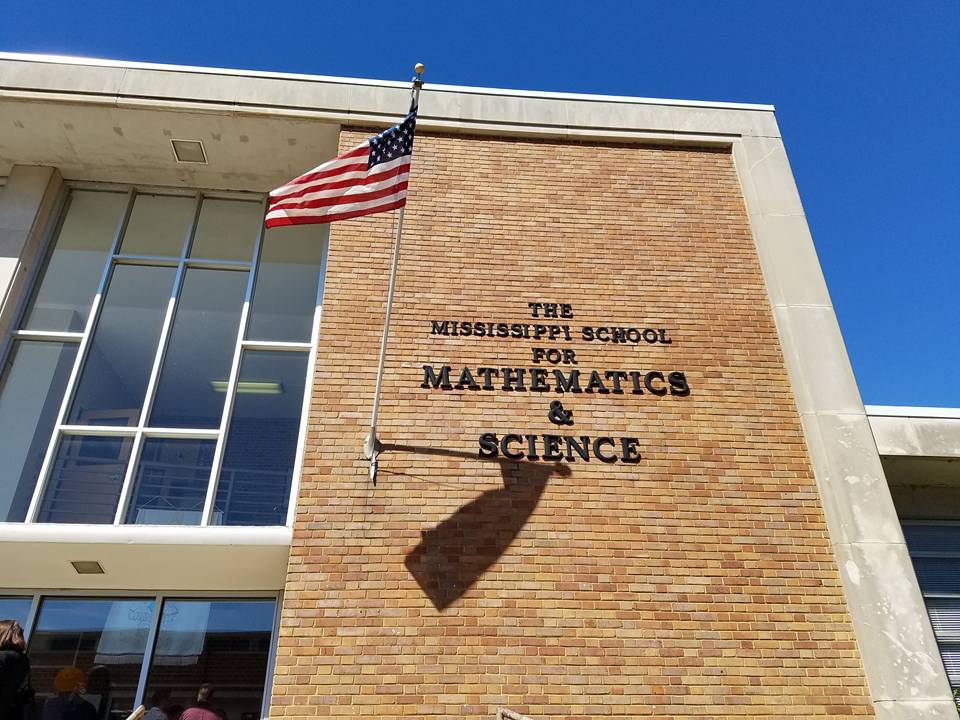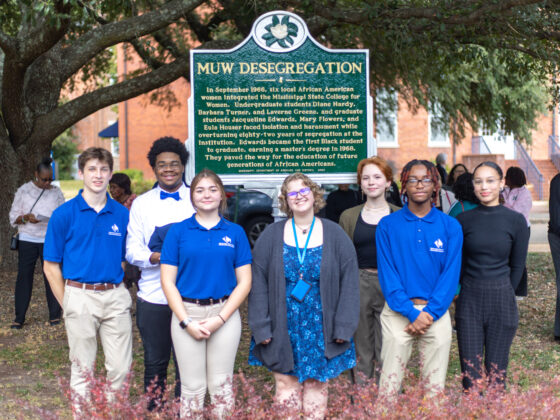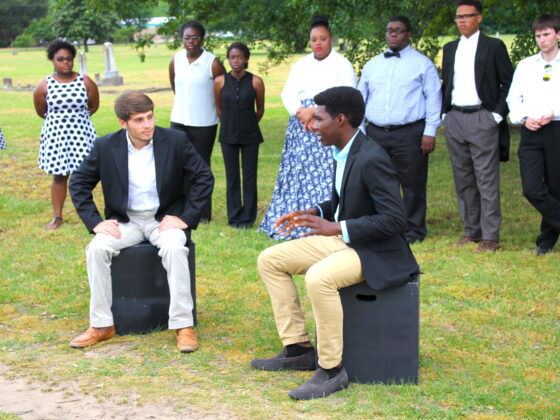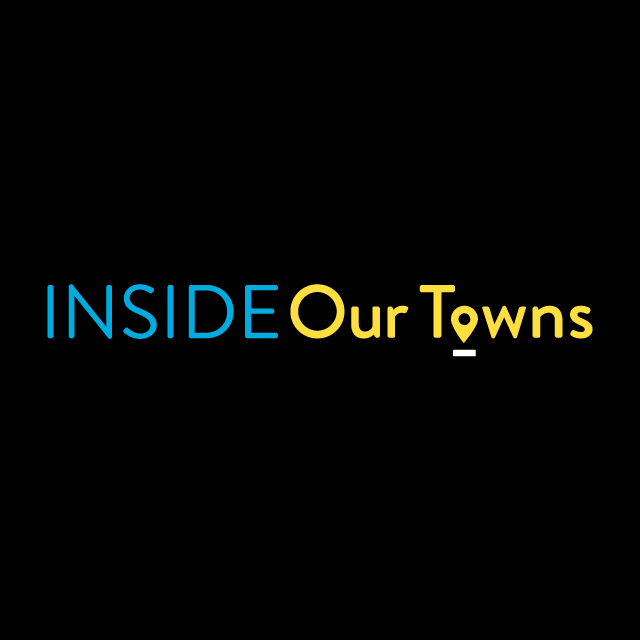Introduction by Deborah Fallows
We have all heard the stories of the toll that the pandemic has taken from schools, students, teachers, and parents. This is the story of another kind – how one extraordinary high school teacher in Mississippi abandoned his successful classroom teaching for an experiment that taught his students so much more than the critiques of Coriolanus that they typically mastered.
In taking up their teacher’s challenge, the students, who come from all corners of Mississippi—from doublewides in the delta to the leafy suburbs of Hattiesburg—have produced podcasts exploring their hometown saints and sinners, or the archives of their towns’ historical moments. Along the way, they aced new technical skills, polished their soft skills, uncovered hometown assets they never knew existed, and gained much human empathy.
Jim Fallows and I first met Thomas Easterling in 2014, during the early days of our Our Towns reporting. Thomas read our stories about a state Governor’s School for the Arts and Humanities in Greenville SC, and he threw down the gauntlet, beckoning us that, “If you think that school is so great, come see what we’ve got in our Governor’s School in Mississippi.” So we did, and I can attest firsthand that his classroom is a vortex of ideas and energy, where the only place you’ll pause is on the edge of your seat.
In the passage you see below, Easterling explains the inception of the student-produced Real Mississippi podcast, in his own words. And then, an example of a student podcast.
By Thomas Easterling
As an English teacher at the Mississippi School for Mathematics and Science—our state’s residential program for academically talented juniors and seniors in Columbus—I spend weeks, sometimes months, getting my students to embrace my rule about audience: if you can’t convince other people you’re right, you might as well be wrong. This notion works well when they’re writing for me. They’re quick. They learn to anticipate quiz and test questions so well they could practically write my assessments for me before the end of the first quarter.
However, writing for a broader audience requires greater discretion and cleverness. It’s also much more important. The highest function of communication involves sharing truths to make the world a better place. As students in my composition classes learn from working on the Real Mississippi podcast, now in its third season, the more difficult the truth, the more carefully it deserves to be rendered.
Like most schools in the spring of 2020 as the Covid-19 pandemic spread, we transitioned from face-to-face classes to remote learning. In my optimistic moments I hoped I was still delivering students the same results in content and style they got when they were here. For a few that might have been the case.
For the others? Nothing mattered. Why pretend that a research paper on The Awakening or Coriolanus was a priority when the adults who are supposed to lead you can’t agree on simple policies? Why get excited about classes when you don’t get to spend time with your friends? How can you do quality research when you also must babysit your younger siblings through their own Zoom sessions?
Some of my students live in such rural parts of the state that they had to drive 20 minutes to download and submit assignments (school-purchased portable hotspots don’t help without a nearby cell tower). The rhythms of the school dissipated with each mile that separated students from our classrooms and residence halls. We became electronic echoes of what we were supposed to be.
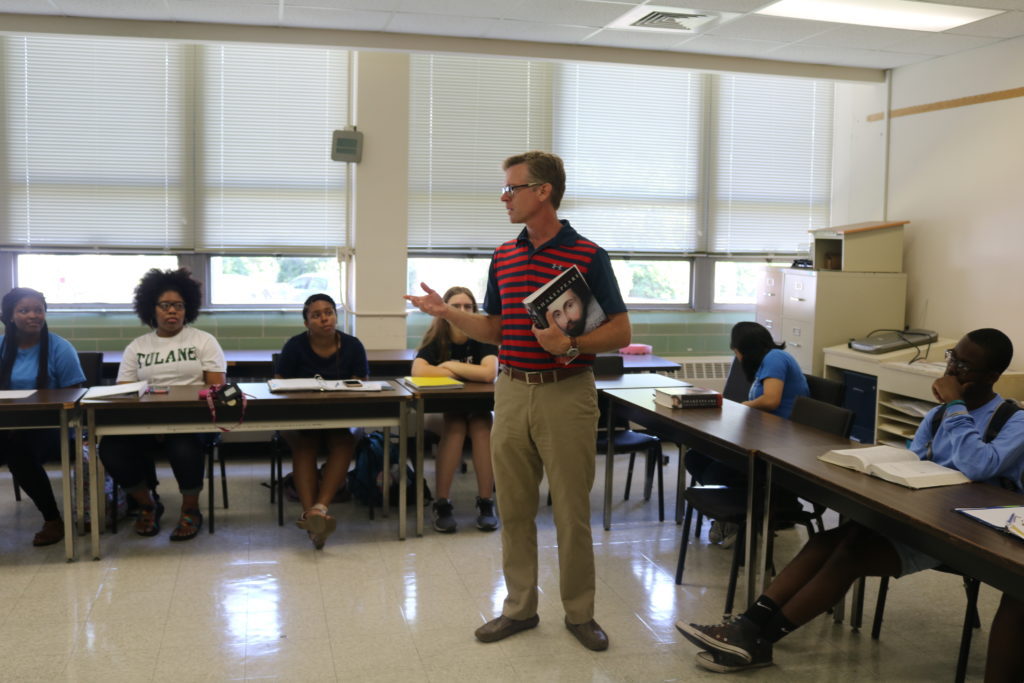
My experience teaching during the pandemic brought me to this conclusion: more than ever before, students need to understand that their voices matter, that the research they do has real-world implications, and that classroom experiences should strengthen their sense of community. Instead of being corollaries to my rule about audience, these ideas became the threads that stitched every activity together. Readings began to stray farther from the canon. Assignments included more self-reflection. And the research paper, once the capstone of junior English, became a segue to something of greater significance: the basis for a podcast script that allows students to share their work with the wider world.
Because MSMS is a residential high school serving kids from around the state, my students live in two worlds: their hometowns and MSMS. I decided to have students research heroes or villains from their hometowns to bridge these worlds. This had the immediate upside of showing students that their work needs to be relatable to those outside the classroom. It also opened doors for interesting primary documents research and interviews. Students who love history can confront events that haunt their hometowns a century after the principal actors died. Future health care professionals can examine the efforts of doctors and nurses during the pandemic. In truth, students have opportunities to research people and ideas that have any tenuous connection to their hometowns.
Guiding students through this process has also helped me add skills to their repertoire that they might not have otherwise gotten. They learn about the importance of using business cards to make introductions and follow-up connections. We have checklists for interview preparation. They have time to design their own stationary so they can send thank-you notes to the people they interview. Students also learn some basics about recording and manipulating sound files, especially those who choose to be producers rather than scriptwriters. We can also use our software platform to see whose podcasts appeal to the greatest number of listeners and discuss possible reasons for their popularity.
Most of all, though, the Real Mississippi podcast gives students incentive to articulate who they are, where they’re from, and where they want to be. It marries style and substance. It shows them people will listen to their well-spoken truths, and encourages them to see that as a crucial step in making Mississippi a better place.
And it reminds them that their voices matter.

Real Mississippi podcast: “You Can Go Back Home Again”
By Raegan Calvert
“Wiggins, Mississippi used to be a town bustling with life. Its downtown area, Pine Hill Avenue, once had businesses lining its streets; however, in recent years, it finds itself with only two businesses left standing,” writes MSMS student Raegan Calvert in introducing her podcast, “You Can Go Back Home Again. “The people in town are growing restless as a discussion concerning Wiggins’ next steps towards growth breaks out within its local government.”
Listen here to Calvert’s episode of Real Mississippi that examines those next steps in an episode produced by fellow MSMS student Braedon Rothert:

